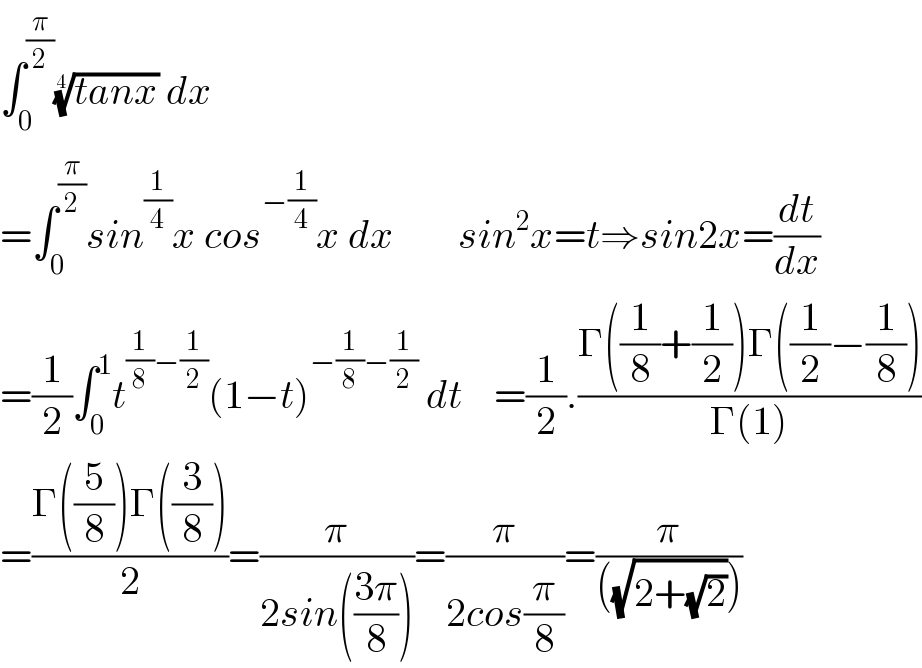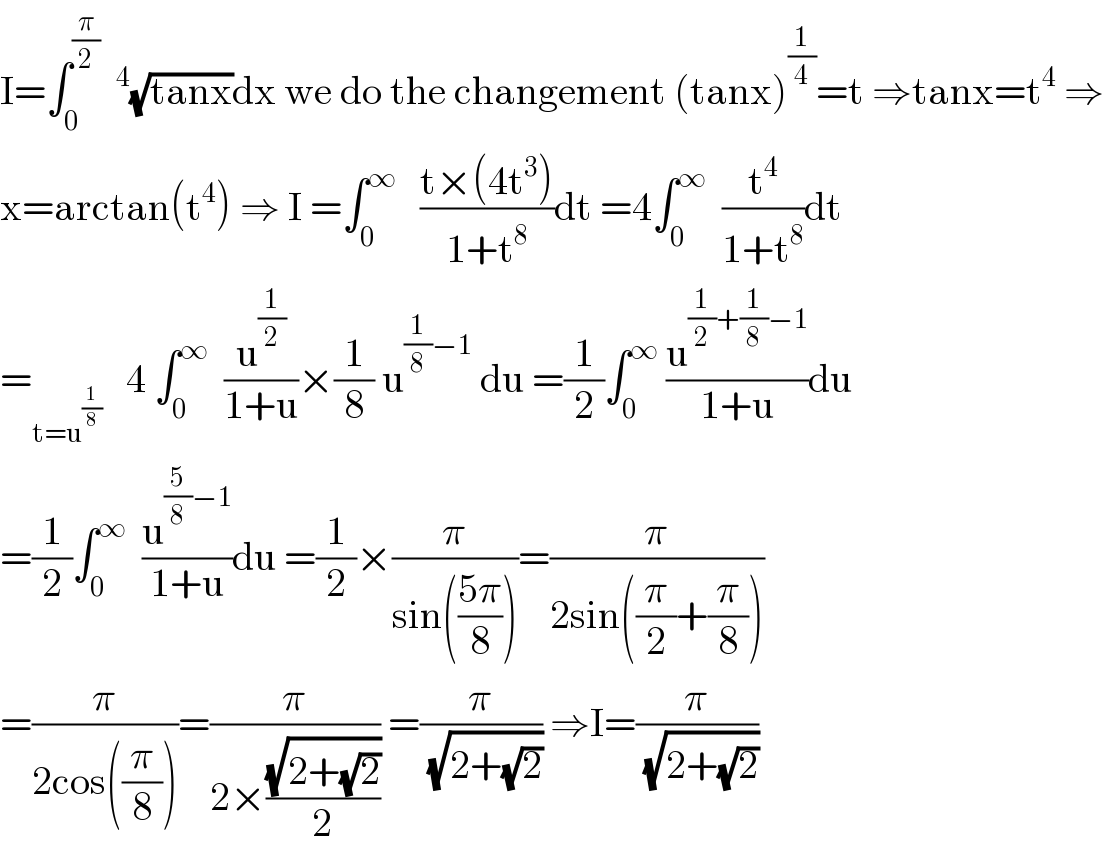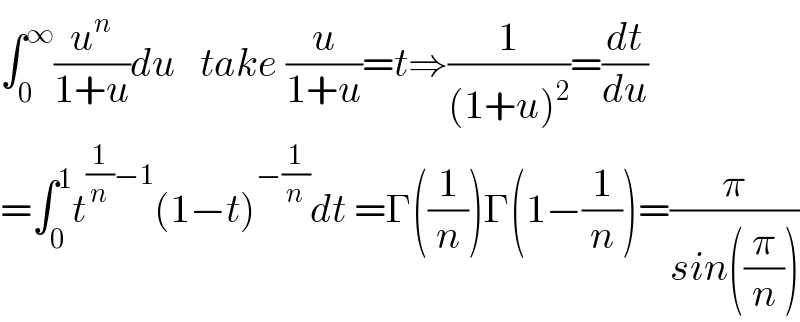Question Number 124957 by Study last updated on 07/Dec/20

Commented by Study last updated on 07/Dec/20

$${please}\:{help}\:{me}?? \\ $$
Answered by Dwaipayan Shikari last updated on 07/Dec/20

$$\int_{\mathrm{0}} ^{\frac{\pi}{\mathrm{2}}} \sqrt[{\mathrm{4}}]{{tanx}}\:{dx} \\ $$$$=\int_{\mathrm{0}} ^{\frac{\pi}{\mathrm{2}}} {sin}^{\frac{\mathrm{1}}{\mathrm{4}}} {x}\:{cos}^{−\frac{\mathrm{1}}{\mathrm{4}}} {x}\:{dx}\:\:\:\:\:\:\:\:{sin}^{\mathrm{2}} {x}={t}\Rightarrow{sin}\mathrm{2}{x}=\frac{{dt}}{{dx}} \\ $$$$=\frac{\mathrm{1}}{\mathrm{2}}\int_{\mathrm{0}} ^{\mathrm{1}} {t}^{\frac{\mathrm{1}}{\mathrm{8}}−\frac{\mathrm{1}}{\mathrm{2}}} \left(\mathrm{1}−{t}\right)^{−\frac{\mathrm{1}}{\mathrm{8}}−\frac{\mathrm{1}}{\mathrm{2}}} \:{dt}\:\:\:\:=\frac{\mathrm{1}}{\mathrm{2}}.\frac{\Gamma\left(\frac{\mathrm{1}}{\mathrm{8}}+\frac{\mathrm{1}}{\mathrm{2}}\right)\Gamma\left(\frac{\mathrm{1}}{\mathrm{2}}−\frac{\mathrm{1}}{\mathrm{8}}\right)}{\Gamma\left(\mathrm{1}\right)} \\ $$$$=\frac{\Gamma\left(\frac{\mathrm{5}}{\mathrm{8}}\right)\Gamma\left(\frac{\mathrm{3}}{\mathrm{8}}\right)}{\mathrm{2}}=\frac{\pi}{\mathrm{2}{sin}\left(\frac{\mathrm{3}\pi}{\mathrm{8}}\right)}=\frac{\pi}{\mathrm{2}{cos}\frac{\pi}{\mathrm{8}}}=\frac{\pi}{\left(\sqrt{\mathrm{2}+\sqrt{\mathrm{2}}}\right)} \\ $$
Commented by mathmax by abdo last updated on 07/Dec/20

$$\mathrm{I}=\int_{\mathrm{0}} ^{\frac{\pi}{\mathrm{2}}} \:\:^{\mathrm{4}} \sqrt{\mathrm{tanx}}\mathrm{dx}\:\mathrm{we}\:\mathrm{do}\:\mathrm{the}\:\mathrm{changement}\:\left(\mathrm{tanx}\right)^{\frac{\mathrm{1}}{\mathrm{4}}} =\mathrm{t}\:\Rightarrow\mathrm{tanx}=\mathrm{t}^{\mathrm{4}} \:\Rightarrow \\ $$$$\mathrm{x}=\mathrm{arctan}\left(\mathrm{t}^{\mathrm{4}} \right)\:\Rightarrow\:\mathrm{I}\:=\int_{\mathrm{0}} ^{\infty} \:\:\:\frac{\mathrm{t}×\left(\mathrm{4t}^{\mathrm{3}} \right)}{\mathrm{1}+\mathrm{t}^{\mathrm{8}} }\mathrm{dt}\:=\mathrm{4}\int_{\mathrm{0}} ^{\infty} \:\:\frac{\mathrm{t}^{\mathrm{4}} }{\mathrm{1}+\mathrm{t}^{\mathrm{8}} }\mathrm{dt} \\ $$$$=_{\mathrm{t}=\mathrm{u}^{\frac{\mathrm{1}}{\mathrm{8}}} } \:\:\:\mathrm{4}\:\int_{\mathrm{0}} ^{\infty} \:\:\frac{\mathrm{u}^{\frac{\mathrm{1}}{\mathrm{2}}} }{\mathrm{1}+\mathrm{u}}×\frac{\mathrm{1}}{\mathrm{8}}\:\mathrm{u}^{\frac{\mathrm{1}}{\mathrm{8}}−\mathrm{1}} \:\mathrm{du}\:=\frac{\mathrm{1}}{\mathrm{2}}\int_{\mathrm{0}} ^{\infty} \:\frac{\mathrm{u}^{\frac{\mathrm{1}}{\mathrm{2}}+\frac{\mathrm{1}}{\mathrm{8}}−\mathrm{1}} }{\mathrm{1}+\mathrm{u}}\mathrm{du} \\ $$$$=\frac{\mathrm{1}}{\mathrm{2}}\int_{\mathrm{0}} ^{\infty} \:\:\frac{\mathrm{u}^{\frac{\mathrm{5}}{\mathrm{8}}−\mathrm{1}} }{\mathrm{1}+\mathrm{u}}\mathrm{du}\:=\frac{\mathrm{1}}{\mathrm{2}}×\frac{\pi}{\mathrm{sin}\left(\frac{\mathrm{5}\pi}{\mathrm{8}}\right)}=\frac{\pi}{\mathrm{2sin}\left(\frac{\pi}{\mathrm{2}}+\frac{\pi}{\mathrm{8}}\right)} \\ $$$$=\frac{\pi}{\mathrm{2cos}\left(\frac{\pi}{\mathrm{8}}\right)}=\frac{\pi}{\mathrm{2}×\frac{\sqrt{\mathrm{2}+\sqrt{\mathrm{2}}}}{\mathrm{2}}}\:=\frac{\pi}{\:\sqrt{\mathrm{2}+\sqrt{\mathrm{2}}}}\:\Rightarrow\mathrm{I}=\frac{\pi}{\:\sqrt{\mathrm{2}+\sqrt{\mathrm{2}}}} \\ $$
Commented by Study last updated on 07/Dec/20

$${why}\:{we}\:{chose}\:{border}\:{than}\:\mathrm{0}\:{to}\:\infty \\ $$
Commented by Study last updated on 07/Dec/20

$${why}\:\frac{\mathrm{1}}{\mathrm{2}}\int\frac{{u}^{\frac{\mathrm{5}}{\mathrm{8}}−\mathrm{1}} }{\mathrm{1}+{u}}{du}=\frac{\mathrm{1}}{\mathrm{2}}×\frac{\pi}{{sin}\left(\frac{\mathrm{5}\pi}{\mathrm{8}}\right)} \\ $$
Commented by Dwaipayan Shikari last updated on 07/Dec/20

$$\int_{\mathrm{0}} ^{\infty} \frac{{u}^{{n}} }{\mathrm{1}+{u}}{du}\:\:\:{take}\:\frac{{u}}{\mathrm{1}+{u}}={t}\Rightarrow\frac{\mathrm{1}}{\left(\mathrm{1}+{u}\right)^{\mathrm{2}} }=\frac{{dt}}{{du}} \\ $$$$=\int_{\mathrm{0}} ^{\mathrm{1}} {t}^{\frac{\mathrm{1}}{{n}}−\mathrm{1}} \left(\mathrm{1}−{t}\right)^{−\frac{\mathrm{1}}{{n}}} {dt}\:=\Gamma\left(\frac{\mathrm{1}}{{n}}\right)\Gamma\left(\mathrm{1}−\frac{\mathrm{1}}{{n}}\right)=\frac{\pi}{{sin}\left(\frac{\pi}{{n}}\right)} \\ $$
Commented by Bird last updated on 07/Dec/20

$$\int_{\mathrm{0}} ^{\infty} \:\frac{{t}^{{a}−\mathrm{1}} }{\mathrm{1}+{t}}{dt}\:=\frac{\pi}{{sin}\left(\pi{a}\right)}\:{with}\mathrm{0}<{a}<\mathrm{1} \\ $$$${this}\:{result}\:{is}\:{proved}\:{see}\:{the}\:{platform} \\ $$
Commented by Study last updated on 08/Dec/20

$${ans}\:{me}\:{please}??? \\ $$
Commented by Study last updated on 08/Dec/20

$${ans}\:{me}\:{please}?? \\ $$
